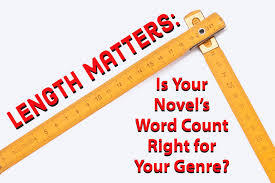My Word Count Obsession

I am a prolific word counter. Yes, I’m a bit obsessed with how many words I’m writing at any given point during my novel-writing process. How did this weird compulsion to be?
Writing a novel is akin to running a marathon. A runner constantly check their time, pace and miles. Or maybe a better analogy would be like building wealth. Sure, you could spend all your money trying to hit the lottery. Or betting your life savings on the roulette wheel. But wouldn’t it be better to save some money every week and invest it? Build wealth instead of trying to make a big score? Of course the big score is sexier and more cinematic. But remember the story of the tortoise and the hare? Slow and steady sometimes wins the race, especially when it comes to writing. And how many of us can write a novel in a day? Or a week? Unless you’re Jack Kerouac writing On The Road on a 120-foot-long scroll of tracing paper.
I often wonder how people back in the day wrote without that little word count box on the right corner of the screen, keeping them in check. I did at one time, oblivious to the ways in which those numbers mattered. Now those numbers ground me, and speak to me about my daily progress. Often, I have to grind out a certain number each day, and I don’t stop until I’ve reached it.
People marvel when I tell them I’ve finished a novel. They often say that they could never achieve such a feat. Admittedly, it is difficult. But then I think about what they’ve said from their perspective. They look at a novel in its entirety, seeing it as singular, monolithic achievement. And it is, to a degree. But writers view that novel differently. Or at least I do. I see the novel as a series of word-building blocks stacked high. Like Legos. Blocks of words arduously formed into sentences. Blocks of sentences arduously formed into paragraphs. Blocks of paragraphs arduously formed into chapters. You get the point.
People say it’s too hard to write a novel. I tell them that if they wrote five hundred words every day for five months they would have a working first draft. An hour each day. An hour of discipline and a dash of inspiration. Sometimes it’s hard to teach the grind, but the grind is all I know as a writer. Not sure creative writing departments teach the grind, and that’s the hardest trait to develop. Grind. Never give up. Keep sitting in that chair and pushing out the words. And that’s where word counting helps me out.
I used to make myself write thirteen hundred words a day come rain or shine. If I wrote beyond that I could bank the extras for a rainy day. Or take a day off. If I didn’t meet my goal, I would have to write more words the next day to make up for the deficit. Couldn’t steal words from someone else.
In this day and age of literary austerity, managing word count matters for a novelist. The days of writing nine hundred page novels are a thing of the past, especially for crime writers. A workable word count for a mystery/crime novel is anywhere between 80,000 to 100,00 thousand words. Publishers have to manage paper costs, as well as cater to the demands of readers who have shorter attention spans. Thus, the need to keep an eye on that little box on the top left corner of the screen is imperative.
I could go on and on about this seemingly mundane subject. It’s not just good enough to be a writer these days. One needs to be an accountant of words. A CPA of literature. A story auditor. Bookkeeper of ideas. Words matter in this business, but so do numbers. Keeping track of them could be the difference between getting published and a rejection letter. So watch your words, brother. Numbers don’t lie, sister. Do the right thing and watch your word count.
I am a prolific word counter. Yes, I’m a bit obsessed with how many words I’m writing at any given point during my novel-writing process. How did this weird compulsion to be?
Writing a novel is akin to running a marathon. A runner constantly check their time, pace and miles. Or maybe a better analogy would be like building wealth. Sure, you could spend all your money trying to hit the lottery. Or betting your life savings on the roulette wheel. But wouldn’t it be better to save some money every week and invest it? Build wealth instead of trying to make a big score? Of course the big score is sexier and more cinematic. But remember the story of the tortoise and the hare? Slow and steady sometimes wins the race, especially when it comes to writing. And how many of us can write a novel in a day? Or a week? Unless you’re Jack Kerouac writing On The Road on a 120-foot-long scroll of tracing paper.

Lea Wait's Blog
- Lea Wait's profile
- 507 followers



